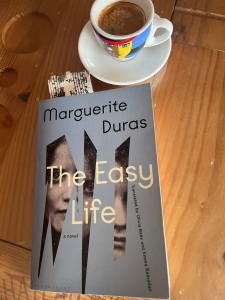There are times one does things that may not make sense afterwards. Sometimes you may not make sense of why you acted in a certain way or did what you did, you must just accept that it had happened and you did or acted in the way what you must have felt necessary at the time rightly or wrongly. You can try to do better next time and you will learn to let go. Quite often, it is pointless trying to explain our actions or omissions. What happens can be everyone’s fault or nobody is at fault particularly. It is what it is, on closer examination, they are all part of human experience.Ultimately be thankful for all the good things and the opportunity to move on.

If you are ambitious, how far will you go to make your dreams happen? In Yellowface by Rebecca F.Kuang, when her friend, Anthena Liu dies, Junie Song Hayward takes Anthena’s unfinished manuscript and works through it. She finds Anthena’s writing ‘simply, breathtakingly gorgeous‘. It seems that Anthena has laid out enough breadcrumbs for her follow the trail. She finds herself writing every day from dawn ro past midnight. She completes the first draft in three weeks and then she takes a week off before she edits it. After making some changes, she sends the manuscript to her agent, Brett Adams. Even though she works hard to polish up the draft, it is clear that she has stolen her friend’s manuscript.
Anthena Liu and Junie Song Hayward first met in their freshman year at Yale. They were on the same floor and attended the same writing course. After graduating, June has struggled with getting her debut published while Anthena’s book is a critical success.

The story is narrated in June’s voice. While June acknowledges that Anthena is talented, she believes that the latter’s success is largely due to her cool Asian charm and that publishing loves her because diversity matters. When Anthena dies in a freak accident, June steals her unpublished manuscript on Chinese labourers during World War I, edits it and publishes it as her own under the name ‘Juniper Song’. She positions herself as Anthena’s best friend and she does not feel remorse as she believes that she has worked hard at the original manuscript, that is fragmented and raw. She justifies her action in getting the manuscript polished and present it to the world.
‘I KNOW WHAT YOU’RE THINKING. THIEF.PLAGIARIZER. AND PERhaps, because all bad things must be racially motivated. Racist.
Plagiarism is an easy way out, the way you cheat when you can’t string words together on your own. But what I did was not easy. I did rewrite most of the book. Athena’s early drafts are chaotic, primordial, with half-finished sentences littered all over the place. Sometimes I couldn’t even tell where she was going with a paragraph, so I excised it completely. It’s not like I took a painting and passed it off as my own. I inherited a sketch, with colors added only in uneven patches, and finished it according ot the style of the original. Imagine if Michelangelo left huge chunks of the Sistine Chapel unfinished. Imagine if Raphael had to step in and do the rest.’

It is clear from the narratives that the relationship between June and Anthena comes across as toxic. While June is jealous of Anthena’s success, Anthena does not think much of June.
In June’s voice: ‘taking Anthena’s manuscript felt like reparations,payback for the things that Anthena took from me‘.
June and Anthena come across very credible characters with their insecurities and racist generalizations about the other. Both of them are self-serving and to further their writing careers, they are capable of justifying their borderline ethically questionable decisions that they have made. In June’s case, even when she is stealing Anthena’s work, she soldiers on and denies all the allegations. She oscillates between her truth and the truth and is being hounded by all the accusations of plagiarism on twitter. She believes that she can still spin things around and profits from it if she can control the narratives. She will do whatever it takes to keep what she thinks she deserves.
Yellowface is plot driven and fast-paced. It is a satire about publishing as a fiercely competitive industry. It discusses the dark side of publishing such as racial profiling and how writers of colour are obliged to write about their experience as minorities and when white writers such as June in the story publishes The Last Front, she is accused of cultural appropriation. Rebecca F.Kuang has cleverly weaved a thought-provoking story about the book world.

I recently read The Easy Life (La vie tranquille), the French author Marguerite Duras‘s second novel. It was written in 1943 and published the following year. It was translated into English by Emma Ramadan and Olivia Baes in 2022. It is about an existentialist crisis of a twenty-five year old woman.

Thinking back to the time I was in my twenties, I was feeling unsettled when friends had already settled down with marriage and whatever that was expected at the time. I was still indecisive about what I wanted to do after having had the benefit and privileges from having received a tertiary education abroad. I was experiencing all that existentialist angst and to some degree I was able to understand what I was going through but to my family it would seem like I was self-centred and self-involved. If I knew better, a different career path might have been put in place but then I probably would have arrived at the same place if you think you believe in destiny. We feel bad if we do nothing and most of us are too afraid of accomplishing nothing, and let our lives slip by. Ultimately, we want to have a purposeful life.
In The Easy Life , The Veyrenattes family has been leading an impoverished life in Les Bugues, the rural southwest of France. Francine Veyrenattes lacks her sense of self. Her younger brother, Nicolas is married to Clémence, a girl whom the family had adopted to be a maid. He had married her after having impregnated her. His neglected wife begins an affair with their uncle, Jérôme whom both Francine and Nicholas have every reason to dislike. Jérôme, their mother’s brother is the reason Nicolas and Francine were never able to study because he had spent all their fortune. They also never had enough money to leave Les Bugues. Their father was a burgomaster in R., a little town in Belgium. Nineteen years ago, when she was little, they had to leave for France because her Papa had used the money from the city hall’s charity box to settle Jérôme’s debt and ‘they hadn’t had time to replace the money before the region prefect’s inspection‘.
‘It was Jérôme who had asked him to do it. But he had been in a panic. And all he’d had to do was refuse.‘
‘Over the course of a single night, he had become a deposed burgomaster, worse htan dishonored, who would no longer make speeches in city hall, who would no longer wear the scarf of his town, who would no longer be greeted in the streets . A man with no choice but to go elsewhere.’

Francine figures that Jérôme had to leave so her brother could live. Nicolas had a violent bawl with Jérôme, and the latter ends up dying from his injuries. Francine has a role to play in the fight that leads to their uncle’s death. For twenty years, Nicolas had wanted to fight Jérôme but he had lacked the resolve and finally he struck his uncle after being told by his sister about his wife’s affair. She had pitted them against each other. She could have prevented the fight but she did not.
The story is narrated in Francine’s voice. There is a lot of introspection on her part. When Tiène, a friend of Nicolas , interrogates her about whether she exposed Jérôme because she secretly wanted him dead. Tiène tells her,
‘”You have to look further than Nicolas’s best interest in order to understand.” Probably. Maybe it was simply the desire to change my existence that had pushed me to denounce Jérôme. But I couldn’t be certain.‘
Tiène appears to be godsend as he shows up one morning and asks to see Nicolas whom he met in Périgueux. He ends up renting a room from the family. Francine and Tiène become close.

Though the family appears indifferent to the uncle’s passing, things can no longer stay the same. They have to lie to the doctor and say that Jérôme had been kicked badly by their mare. There is still chaos and then Nicolas is found dead on the railway track. It could be suicide. When another tragedy strikes, Francine has to go away. She needs to get away and when she tells Tiène about her wish to go to T, an Atlantic Beach , Tiène gives her money and asks her to go. There she rests and she surrenders ‘to the parade of her thoughts.There she has café au lait that is waiting for her when she walks into the room‘. She muses: ‘Not like in Les Bugues, where you have to prepare it for everyone.‘
The Easy Life by Marguerite Duras (1914-1996)is about the existentialist conflicts of a young woman who is a witness to what is happening in her family. There is no real plot but a lot of internal dialogue that shows the mental state of the main character.
I read that Marguerite Duras had suffered great distress in the year prior to writing The Easy Life. Her first child was stillborn, her younger brother had passed and her husband was imprisoned in Buchenwald. She was then thirty years old.
